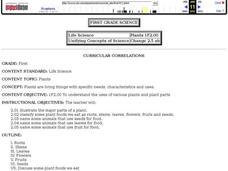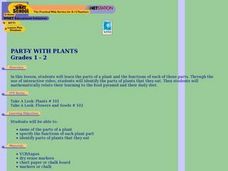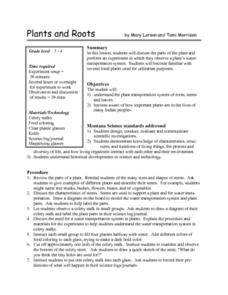Curated OER
Looking at Flowers
Pupils use their bee sticks to cross-pollinate their Fast Plants and also focus in on the anatomy of flowers. They analyze how the parts of a system go together, and how these parts depend on each other. Finally, students describe why...
Curated OER
Plants
Students illustrate the major parts of a plant, classify some plant foods we eat as roots, stems, leaves, flowers, fruits and seeds. They also name some animals that use seeds, leaves, and fruit for food.
Curated OER
Explore: 1st Grade Plant Observation
First graders grow seeds in a mini terrarium. They compare the root systems, stems, leaves, and flowers of the different plants. They categorize the plants and discuss the basic functions of plant parts.
Curated OER
Party with Plants
Students watch a video on plant parts and identify the function of plant parts. In this plants lesson plan, students identify the parts of plants they eat and relate it back to the food pyramid and perform math problems as they do this.
Curated OER
Plant Parts
Students use "Kid Pix" to explore plants. In this science and technology lesson plan, students become familiar with plant parts and label them on a plant. Students tell the functions of each of the plant parts.
Curated OER
Plants and Animals, Partners in Pollination
Students participate in multiple hands-on activities to explore reproduction and pollination. In groups, using a cotton swab and powder, students simulate being pollinators and plants. They name the parts of the flowers and the function...
Curated OER
Genetics Crossword
For this biology worksheet, students complete a crossword puzzle with 38 questions on genetics. They identify the different parts and functions of a flower.
Curated OER
Making Community Measurements: Which Plant Part?
Students identify a plant in a given community and make a variety of measurements. They determine how a plant meets its basic needs. In addition to identifying plant parts, they observe seasonal change and compare plants within a community.
Curated OER
Glossaries
Explore text structure with a focus on the glossary feature in informational texts. Learners read a brief introduction before examining a glossary from a text about plants. They reference it while completing four comprehension questions....
Perkins School for the Blind
Tactile Journals
I absolutely love this idea. Children with visual impairments create tactile journals which describe an event from the previous week in an artistic way. They verbally describe one event from the previous week and then use a wide array of...
Curated OER
Introduction To Floral Morphology
Students create a model of the four basic whorls of flowers using a water bottle, construction paper and Q-tips. They then examine fresh flower specimens to see how the basic structure can vary in different species of flowering plants.
Curated OER
Violets, Daffodils, Roses and Thorn
Fourth graders complete a variety of exercises and activities surrounding the scientific and artistic properties of the parts and processes of a plant/flower.
Curated OER
Making a Brassica Model
Students apply skills they have learned to construct an accurate model of the Brassica and then work together on a group project. They analyze how the parts of a system go together, and how these parts depend on each other. Finally,...
Curated OER
Why Are Bees Important?
Students identify and analyze pollination and how bees play an important part in the life cycle of flowering plants. They also identify the process of plant pollination and how bees play an important part in the life cycle of flowering...
Biology Junction
Introduction to Plants
In this biology lesson, students identify the different types and parts of the plant. They complete a crossword puzzle with 37 questions about plants.
Curated OER
Wacky Weed Parts
Students view picture of weed and identify roots, stems, flowers, leaves, and seeds, describe function of each different weed part, and discuss how different parts of weed work together to benefit plant in its new environment.
Curated OER
Seed Structure and Seed Dispersal
Third graders plant seeds. In this seed structure activity, 3rd graders identify parts of a seed and plant a lima bean seed. Students discuss and reflect on the process in their journals.
Curated OER
Plants and Roots
Learners discuss the parts of the plant and
perform an experiment in which they observe a plant's water
transportation system. They become familiar with
several local plants used for utilitarian purposes.
Alabama Learning Exchange
The Amazing Antigravity Stem
Second graders investigate how the stem of the plant carries water and minerals upwards from the roots to other parts of the plant. They observe what happens after a flower is placed in dyed water. They word process their observations...
Curated OER
Rainforest Plant or Animal?
Students explore the major functions of plants and animals. In this rainforest lesson plan students create a Venn diagram to compare and contrast animals in the rainforest.
Write.com
Lead vs. Led
Teach a lesson on the commonly confused words lead and led and assign this activity to review the material. Learners must not only choose the correct word for each sentence, but they also need to determine whether the word is used as a...
Curated OER
Plant a Seed of Kindness
Students perform acts of kindness. For this character lesson, students cut out seed shapes and write down their acts of kindness on them. Students place the seeds on a bulletin board where they "plant" them below the grass...
Curated OER
It's Challenging Being Green!
Students influence the plant life cycle as they take care of plants.In this caring for plants lesson, students understand the parts of the plant and their functions in keeping it alive. Students participate in experiments with plants and...
Allegany-Limestone Central School
Plantae WebQuest
Send your young life scientists on a plant webquest that has them reading case studies to decide if seeds are seeds and plants are plants.

























